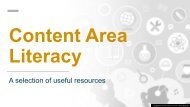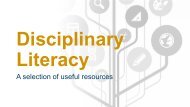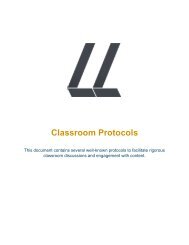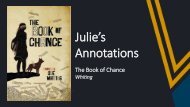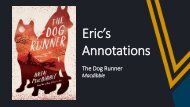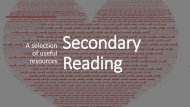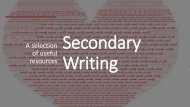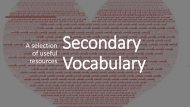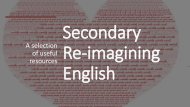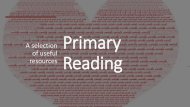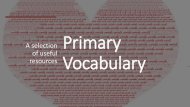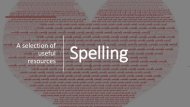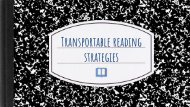Primary - Writing Magazine 2021
You also want an ePaper? Increase the reach of your titles
YUMPU automatically turns print PDFs into web optimized ePapers that Google loves.
A selection<br />
of useful<br />
resources<br />
<strong>Primary</strong><br />
<strong>Writing</strong>
Welcome to <strong>Writing</strong> Workshop:<br />
Engaging Today’s Students with a<br />
Model that Works<br />
Shubitz & Fordma (2019)<br />
Through strategic routines, tips, advice, and resources, as well as<br />
short, focused video clips, teachers can create the sights and sounds<br />
of a thriving writing workshop in their F-6 classrooms where:<br />
• Students look forward to writing, and spend most of their<br />
time doing it-not just learning about it<br />
• Student choice is encouraged to help create engaged<br />
writers<br />
• Students are part of the formative assessment process,<br />
managing their own growth as writers<br />
• Students will look forward to writing<br />
This book is a great introduction to the writing workshop. It<br />
provides examples of what the teacher and students should be<br />
doing in each part of the workshop and gives practical activities for<br />
teachers who are new to writing workshop.
Teach <strong>Writing</strong> Well:<br />
How to Assess <strong>Writing</strong>, Invigorate<br />
Instruction, and Rethink<br />
Culham (2018)<br />
This book shows you how to assess and teach writing in a way<br />
that’s practical and achievable.<br />
Part 1 walks you through the traits of writing and their key<br />
qualities, showing step by step how to read students’ writing<br />
and offer feedback that nudges them forward through the<br />
revision process.<br />
Part 2 focuses on instruction, offering specific guidance for<br />
how to use what you’ve learned from reading student writing<br />
to design lessons that scaffold students toward making their<br />
own craft decisions and revisions. In addition, there’s an<br />
entire chapter devoted to mentor texts that you can use to<br />
model traits and key qualities for your students.
Hidden Gems: Naming and<br />
Teaching from the Brilliance in<br />
Every Student’s<br />
Bomer (2010)<br />
This book focuses on building teacher capacity to name and<br />
notice the strengths in student writing.<br />
Bomer discusses the importance of the admiring lens and<br />
provides advice on giving effective feedback to students<br />
including:<br />
• spot hidden stylistic gems in writing that are<br />
unconventional or vernacular<br />
• uncover content and organisational gems even when<br />
you don't find the subject matter engaging or<br />
significant<br />
• respond by naming and celebrating writers' gems<br />
instead of hunting for mistakes
Notebook Know How: Strategies<br />
for the Writer’s Notebook<br />
Buckner (2005)<br />
This book shows teachers how to transform the Writer's<br />
Notebook from just a place to write stuff down, to a vital,<br />
constantly evolving tool for each individual child. From<br />
notebook set up, tips, lessons and questions of whether to<br />
evaluate the notebook, Buckner gives teachers a lot to<br />
consider.<br />
Some teacher questions Buckner addresses include:<br />
• How do I launch the notebook?<br />
• What mini-lessons can be used throughout the year to<br />
help students become more skilled in keeping<br />
notebooks?<br />
• How can writer’s notebooks help students become<br />
better readers?<br />
• How do I assess notebooks?
The <strong>Writing</strong> Strategies Book<br />
Serravallo (2017)<br />
This book has 300 effective strategies for teaching. They have<br />
been grouped beneath 10 crucial goals. This book supports<br />
teachers to:<br />
• provide students step-by-step strategies for writing<br />
with skill and craft<br />
• coach writers using prompts aligned to a strategy<br />
• present mentor texts that support a genre and strategy<br />
• adjust instruction to meet individual needs<br />
• demonstrate and explain a writing move<br />
• provide feedback to young writers<br />
There are suggestion for stocking your writing centre, planning<br />
units of study, celebrating student writing, keeping records<br />
ideas for anchor charts and examples of student work.
Igniting <strong>Writing</strong>: When a<br />
Teacher Writes<br />
Wright (2011)<br />
This book is a passionate portrayal of the journey teachers<br />
go on when they decide to write for and with their young<br />
writers.<br />
Alan takes you through the approach of modelling and<br />
demonstrating writing for students as they struggle and<br />
learn from the challenges, and joys of becoming confident<br />
writers and communicators.<br />
When your students see that writing is something you do<br />
too, a sense of community is created in the classroom and<br />
you become more credible as a teacher of writing. The<br />
results are happier, more resourceful students who aren't<br />
turned off by the idea of writing, and benefits that can be<br />
seen in all subjects involving literacy.
The Write Genre<br />
Rog & Kropp (2010)<br />
This book is organized around six writing genres, more than<br />
fifty mini-lessons deal with specific skills that help students<br />
write effective fiction and nonfiction in such genres as:<br />
• Personal memoir<br />
• Fictional narrative<br />
• Informational report<br />
• Persuasive and Procedural writing<br />
• Poetry<br />
The book also offers chapters devoted to the writing process,<br />
writing workshop, and using rubrics for instruction and<br />
assessment using the 6 Traits.
6+1 Traits of <strong>Writing</strong>:<br />
The Complete Guide for the<br />
<strong>Primary</strong> Grades<br />
This book introduces each trait in depth. It<br />
examines samples of students’ writing<br />
looking for evidence of the traits.<br />
This would be a useful book study to build<br />
teacher knowledge of each of the traits.<br />
It is designed for teachers up to year 3.<br />
Culham (2005)
6+1 Traits of <strong>Writing</strong>:<br />
The Complete Guide Grades 3<br />
and Up<br />
This book introduces each trait in depth. It<br />
examines samples of students’ writing<br />
looking for evidence of the traits.<br />
This would be a useful book study to build<br />
teacher knowledge of each of the traits.<br />
It is designed for teachers of years 3 - 6<br />
Culham (2007)
Traits of <strong>Writing</strong>:<br />
The Complete Guide for Middle<br />
School<br />
This book introduces each trait in depth. It<br />
examines samples of students’ writing<br />
looking for evidence of the traits.<br />
This would be a useful book study to build<br />
teacher knowledge of each of the traits.<br />
It is designed for teachers of years 5 - 8<br />
Culham (2010)
The No-Nonsense Guide to<br />
Teaching <strong>Writing</strong><br />
Davis & Hill (2003)<br />
Authors Judy Davis and Sharon Hill are two expert<br />
teachers who have lived the teaching of writing<br />
from inside the classroom. This book is a guide<br />
packed with practical ideas, tools and thoughtful<br />
strategies for your classroom.<br />
There are several units of study included.<br />
Davis and Hill help teachers prepare tools, address<br />
management issues, get the work started, and<br />
build momentum as students increase their<br />
understanding of good writing practice.
<strong>Writing</strong> Workshops:<br />
The Essential Guide<br />
Fletcher & Portalupi (2001)<br />
A valuable resource for developing and<br />
maintaining a writing workshop in the classroom.<br />
The authors lay out each step in the writing<br />
workshop process, including strategies, ideas and<br />
the foundational classroom principles necessary<br />
for incorporating successful writing workshops<br />
into each student’s daily schedule.<br />
Each chapter details how a specific component of<br />
the writing workshop looks, functions and is<br />
taught.
A Teacher's Guide to Getting<br />
Started with Beginning Writers<br />
Ray & Cleaveland (2018)<br />
This book looks at how teachers can get<br />
beginning writers creating books from<br />
their very first week at school!<br />
It includes links to videos and has lots of<br />
food for thought about setting<br />
beginning writers up for success.
A Teacher’s Guide to <strong>Writing</strong><br />
Conferences: Grades K-8<br />
Anderson (2018)<br />
In this book Anderson explores the different paths a writing<br />
conference can take and gives teachers advice for making<br />
these useful for the writer including:<br />
• how to get started with conferring, or improve your<br />
existing conferences<br />
• how to use conferences to meet the diverse needs of<br />
your student writers<br />
• how to fit conferences into your busy writing workshop<br />
schedule.<br />
The book includes links to high quality videos that would be<br />
excellent PD for any group of teachers wanting to learn more<br />
about teaching and conferring with writers.
The Literacy Teacher’s<br />
Playbook: Grades K-2<br />
Helps teachers ensure that each student finds his or her<br />
path to meeting their learning goals. Serravallo’s four-step<br />
protocol leads teacher towards goal-directed instruction:<br />
• collect the data<br />
• analyse the data<br />
• synthesise data<br />
• develop instructional plans<br />
• follow-ups to monitor progress.<br />
Designed for Grades F-2<br />
Serravallo (2014)
The Literacy Teacher’s<br />
Playbook: Grades 3-6<br />
Helps teachers ensure that each student finds his or her<br />
path to meeting their learning goals. Serravallo’s four-step<br />
protocol leads teacher towards goal-directed instruction:<br />
• collect the data<br />
• analyse the data<br />
• synthesise data<br />
• develop instructional plans<br />
• follow-ups to monitor progress.<br />
Designed for Grades 3-6<br />
Serravallo (2013)
First Grade Writers<br />
Parsons (2005)<br />
This book includes five specific units of study for your<br />
writing workshop that help students prepare thoughtfully to<br />
write.<br />
The units also help children to differentiate the planning and<br />
organisation needed to write fiction, personal narrative,<br />
nonfiction, Q & A books and pattern books.<br />
Each unit is concise, logically laid-out descriptions of how<br />
each unit of study operates, a variety of helpful tables,<br />
charts, and assessment diagnostics, as well as elaborations,<br />
teaching points for minilessons and conferences,<br />
troubleshooting tips, and month-by-month planning<br />
assistance.
Second Grade Writers<br />
Parsons (2007)<br />
This book includes five specific units of study for<br />
your writing workshop that help students prepare<br />
thoughtfully to write.<br />
Each type of writing has a different purpose and<br />
audience and the units of study include concise,<br />
logically laid-out descriptions of how each one<br />
operates, a variety of helpful tables, charts, and<br />
assessment diagnostics, as well as elaborations,<br />
teaching points for minilessons and conferences,<br />
troubleshooting tips, and month-by-month<br />
planning assistance.




